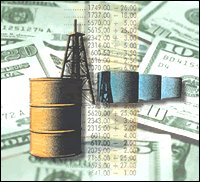Why Don't All Of The Markets Trade Electronically?
 Recently, the futures markets have been gaining exposure with the volitility of the energy markets. With this exposure come traders looking for more opportunities in placing trades. Traders are looking at both the open outcry arena, as well as the infamous electronically traded sessions. Unlike many of our competitors, we don't restrict our clients' trading opportunities by ignoring the fact that many important futures products still trade in the old-fashioned trading pits. Hence, both are available to our clients at their discretion. However, one story we offer, that has a different spin on the tired, old story that everyone's covered pretty exhaustively, is why aren’t all products traded electronically? Why wouldn’t all the exchanges go completely electronic, you ask?
Recently, the futures markets have been gaining exposure with the volitility of the energy markets. With this exposure come traders looking for more opportunities in placing trades. Traders are looking at both the open outcry arena, as well as the infamous electronically traded sessions. Unlike many of our competitors, we don't restrict our clients' trading opportunities by ignoring the fact that many important futures products still trade in the old-fashioned trading pits. Hence, both are available to our clients at their discretion. However, one story we offer, that has a different spin on the tired, old story that everyone's covered pretty exhaustively, is why aren’t all products traded electronically? Why wouldn’t all the exchanges go completely electronic, you ask? Electronic trading is the direction in which the industry has been going towards and will continue to move in the future, because the benefits are undeniable. For traders, electronic trading is faster, more accurate, and less expensive. And investors in the exchanges expect that electronic trading will boost volume and profitability. This isn't even news anymore.
But looking at a different angle -- which might make for a more unique story -- is that it's actually remarkable how a number of futures markets have so far managed to fend-off and delay this change. We talked about how many important futures products still trade exclusively in open-outcry trading pits during regular business hours (copper, soybeans, corn, wheat, coffee, sugar, cocoa, cotton, orange juice, cattle, hogs, lumber, etc.). And there are even examples where electronic alternatives exist, but the pits remain the primary trading venue for certain products (gold, silver, crude oil, natural gas, etc.).
Do you wonder how the trading pits have been able to defend their turf? The conventional answer is, partly through politics. Even though the leading futures exchanges have gone public or are planning to do so, floor brokers and local traders remain important constituencies. Another good answer is that it's historically just been very difficult to launch a competing product and to wrestle market share away from an entrenched exchange. Traders all want the best pool of liquidity, the best pricing, and the best executions, so they're reluctant to try a new, competing contract -- even if the new contract is all-electronic.
To summarize, electronic futures trading is going to continue to gain ground. But three years ago, if you'd asked practically any futures brokerage executive to comment on the outlook for open-outcry trading, you'd have heard that the demise of the trading pits was imminent. And the fact is that this just hasn't happened as quickly as many expected -- the trading pits have been more resilient than anyone imagined. That's the under-reported and more interesting story, we think.


<< Home